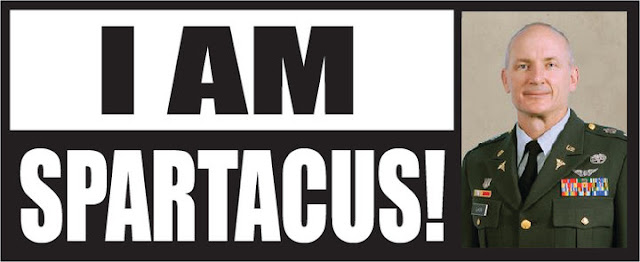Articles Tagged with UCMJ
More on LTC Lakin from the motions hearing
I posted a tease here, and it didn’t take long for Dwight “My Liege” Sullivan to crack the code.
In other words, Judge Lind used the word “embarrassment” in precisely the political question doctrine context (and using almost exactly the same words) as CAAF in New and the Supremes in Baker v. Carr. And all the breathless birther commentary saying that she was attempting to avoid personal embarrassment to President Obama is just so much guano.
As always one has to admire Dwight’s pithy commentary. OK, here is some more (working from a “bigger” computer, netbooks have some limitations).
Humor in military uniform law
Here is a link to the 3 September 2010 Federal Register for the recent MCM amendments signed by The President.
And the humor you say – – – –
Hat tip to Native and Natural Born Citizenship Explored blog (a not a birther blog).
LTC Lakin continues to spin
Found at birtherreport.com.

LTC Lakin and Mr. Jensen will be on the Barry Farber radio tonight at 2000.
Apparently the “embarrsassment” language was intended by the judge to alert Congress that they need to begin impeachment proceedings.
NMCCA decisions
NMCCA has released a number of decisions. Several have providency issues and issues not raised by appellate counsel.
United States v. Messias. The court set-aside a finding of guilty to because of an inadequate providence inquiry. No sentence relief granted.
While the providence inquiry establishes facts sufficient to demonstrate that the appellant drove on base and that he believed the driving to be wrongful, there are no facts developed which establish either the invalidity of the appellant’s license, if any, or in the alternative, his failure to have a valid license in his possession. We cannot infer either eventuality from this record. We are left with a substantial basis in fact to question this plea and conclude the military judge abused his discretion in accepting this plea on these facts.
LTC Lakin update
safeguardourconsititution (APF) has an affidavit from LTG T. McInerney in support of LTC Lakin’s discovery request.
Lawyers interested in the legal merits of the issue will likely find themselves dissatisfied with the affidavit. It is a combination of justification for LTC Lakin’s contumacy and reasons why the discovery should be granted. There is no comment on the general failure of most of the rest of the officer corps in continuing to obey unlawful orders. They have not posted the request or motion in support of any request. Once again failing to give full disclosure.
The affidavit appears to also justify the discovery request as a need for public disclosure. This would be IMHO an abuse of process. The purpose of discovery in a criminal proceeding is to aid the defense, not to aid public disclosure for disclosures sake.
Up periscope
AP is reporting that the Khadr detainee trial will begin again 18 October.
Here is an interesting Washington Post opinion piece about some contractors in Iraq.
THE ALLEGATIONS are sadly familiar by now: The men were picked up by U.S. military forces, locked in tiny cells, deprived of sleep, and subjected to extreme temperatures and loud music.
New ACCA case
ACCA has released an unpublished opinion in United States v. Delagarza. It’s an odd case.
A military judge sitting as a general court-martial convicted appellant, pursuant to his pleas, of violating a general order, false official statement, and two specifications of larceny (from his fellow soldiers), in violation of Articles 92, 107, and 121, Uniform Code of Military Justice, 10 U.S.C. §§ 892, 907, and 921 [hereinafter UCMJ]. The military judge sentenced appellant to a bad-conduct discharge, confinement for eighteen months, and reduction to the grade of E-1. The military judge further recommended that only twelve months of confinement be approved, if appellant made full restitution. The convening authority, as an act of clemency, limited confinement to fifteen months, and otherwise approved the adjudged sentence.
In his brief, appellant raises one assignment of error, post-trial ineffective assistance of counsel, which warrants discussion, but no relief. (Emphasis added.)
 Court-Martial Trial Practice Blog
Court-Martial Trial Practice Blog






